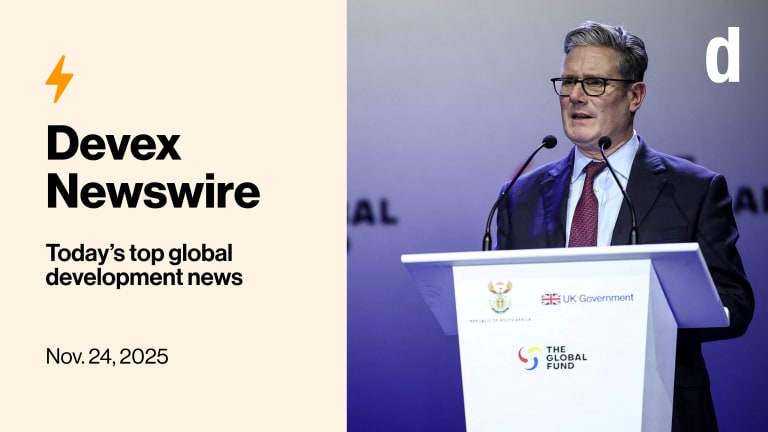
A child born today in Kenya, Senegal, or Uganda is far more likely than ever before to live a healthy, full, and productive life. There has been an extraordinary increase in life expectancy of 20% to 32% in these countries since the turn of the century, in large part due to a significant increase in childhood vaccination, the increase in HIV-positive people receiving lifesaving treatment which also prevents new infections including transmission from mothers to infants, and highly successful efforts to treat malaria and prevent new infections.
These health gains not only save lives but are inextricably linked to stronger economies and more stable societies.
Bipartisan U.S. leadership in global health across several administrations and 8 congresses has been central to this progress. Investments and partnership through both novel international public-private partnerships such as Gavi, the Vaccine Alliance and the Global Fund to Fight AIDS, Tuberculosis and Malaria, and bilateral programs, such as the President’s Emergency Plan for AIDS Relief and the President’s Malaria Initiative have helped to raise the bar for effective interventions in global health — increasing accountability and impact, driving inclusion of the private sector, faith-and community-based organizations, and increased financial contributions from other high-income countries for shared responsibility.
Fund sharing and fragility in spotlight at Africa policy congressional hearing
The House Foreign Affairs committee held a wide-ranging hearing last month focused on how USAID, the Department of State, and the Department of Defense can coordinate on Africa policy. Here's what you need to know.
The House Committee on Appropriations, on May 16, continued Congress’ bipartisan leadership on global health, by approving a 2020 funding bill that provides the first increase in six years for the Global Fund — a strong “first installment” for the Global Fund’s 2020-2022 replenishment cycle — and maintains support for PEPFAR and PMI.
Such U.S. investments have helped catalyze domestic resource mobilization for health by governments, communities, and partners throughout the African continent. Powered by substantial economic gains across much of the African continent, and a political recognition by the African Union and governments of the societal benefits of health investments, 29 African countries increased their investments in health since 2000.
This commitment to increased domestic financing for health was further advanced to the top of the regional agenda at the “game-changing” African Leadership Meeting, “Investing in Health,” hosted by the African Union as part of its 32nd Summit in February 2019.
In his remarks at the meeting, Rwanda’s President Paul Kagame noted “investing in the health of our citizens has already had transformative effects on the people of our continent … governments should surely be willing and able to increase domestic investment in health care.”
The African Union had already focused on increased domestic finance for health, creating the first “scorecard” reviewed by heads of state during each summit. The African Leadership Meeting led to new commitments that will not only report progress, but will provide countries with important tools to put in place policies and practices to drive further increases in an accountable and transparent way.
In addition, regional “hubs” will be established so countries can learn from each other and, importantly, international partners can more effectively dedicate technical and financial resources to maximize impact. The new strategy being put in place by Africans can become the model for other regions of the developing world.
Several countries are pioneering increased taxes specifically to fund health programs, such as Zimbabwe’s AIDS payroll levy which grows with the economy and currently funds approximately 11% of the expenses for HIV treatment in the country. Others, for example Benin, Senegal, Ghana, and Kenya, have implemented a variety of approaches to fund a national health insurance system to provide a safety net.
As African leaders advance their commitments to fund some of the world’s most pressing health challenges, the United States should meet that ambition with robust commitments of our own.
We are entering an era where African leadership will increasingly define and lead the efforts in global health security, migration, and broader improvements in health that will further stimulate a virtuous cycle of development. This is not the time to back away from US support, as the current administration has suggested.
That approach threatens to abdicate U.S. leadership, decrease funding by other high-income countries, especially the Europeans, reverse the historic gains in health of the past 20 years, undermine the ripple effects of such strong support — including opening markets to U.S. goods and services — and drive countries into China and Russia’s welcoming arms. Both countries are significantly increasing their global health footprint in Africa.
Rather, it is the time to double down on the great health successes that have been achieved and the diplomatic, security, and economic benefits the U.S. has received by increasing our funding for the upcoming Global Fund and Gavi replenishments and for PEPFAR and other bilateral global health programs.
Africa’s leaders are taking concrete and innovative steps to pay for their own health care over time. It is in our interest to walk with them a while longer on what U.S. Agency for International Development Administrator Mark Green has called the “journey to self-reliance,” so that when that place is reached, it is the U.S., not Russia and China, standing with them.
Update, June 6, 2019: This opinion piece has been updated to reflect that bipartisan U.S. leadership in global health across 8 congresses has been central to supporting health progress in Africa.










